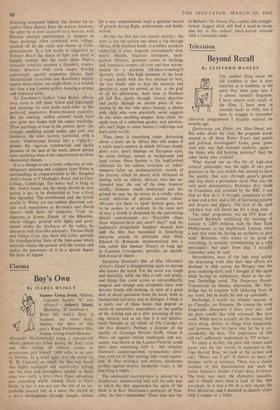Cinema
Boy's Own
By ISABEL QUIGLY BOTH this week's films, it happens, are about boys; Sammy, the hero of ' this year's Royal Performance film, Sammy Going South (director:
Alexander Mackendrick), being a ten-year-old whose parents are killed during the Suez crisis and who, setting off without money or possessions, gets himself 5,000 miles to an aunt in Durban. In a small quiet way the novel by W. H. Callaway on which the film. was based was highly successful and satisfactory, getting just the tone and atmosphere needed to Make what was really a Boy's Own Paper adventure into something worth reading' about at other levels; in fact it was not just the tale of an im- probable journey but, in a sense, the record of a boy's development through danger, almost
(in a very unpretentious way) a spiritual record of growth during flight, achievement and finally arrival.
All this the film has lost almost entirely: the story is just the surface one about a trip through Africa, with elephant herds, crocodiles, monkeys chattering in trees, leopards triumphantly shot, heavy officials, hilarious foreigners, back- ground Africans, getaways comic or thrilling, and impressive scenery. all now and then accom- panied by a plaintive (Moslem-sounding?) heavenly choir. The high moments of the book (a man's death with the boy chained to him; the boy finally able to face the memory and describe it; even his arrival, at last, at the goal of all his adventures, Aunt Jane in Durban) ,all fall flat, partly through clumsy direction and partly through an outsize piece of mis- casting in the boy who plays Sammy. a plump pink child who even physically never suggests he has done anything tougher than climb the apple trees of a suburban garden, and emotion- ally can't begin to make Sammy's sufferings and fears come to life.
Then there is something rather distressing about a story set in Africa that still makes it a white man's country in which Africans simply don't exist, don't impinge on European eyes, let alone feelings, except as background and local colour. Once Sammy is (by implication) criticised for his callous reversion to 'white' manners (after an uncharacteristic stretch of his journey which he shares with Africans) in dealing with an elderly African who has be- friended him; the rest of the time, however scruffy, however much sunburned and be- grimed he may be, he moves in a wholly white world, oblivious of anyone another colour. Africans are there to hand Sammy guns, not to be spoken to or noticed. In the same sort of way a Greek is dismissed by the patronising district commissioner as: 'Excitable chaps those whatever-he-is are, aren't they?' and the audience's sympathetic laughter showed how well the film had succeeded in funnifying everyone outside its particular club. Only Edward G. Robinson, sentimentalised into a role rather like Spencer Tracy's so long ago in Captains Courageous, provides an unclub- bish brand of charm.
Damiano Damiani's film of Elsa Morante's Arturo's Island is disappointing again to anyone who knows the novel. For the novel was tough and beautiful, while the film is soft and pretty, and things that came across as extraordinarily magical and strange and acceptable have now becoMe faintly silly-looking, in spite of a good deal of direct quotation from the book, both as background narrative and as dialogue. I think it is really one of those books that depend so much on cumulative atmosphere, on the quality of the writing and on a slow mounting of feel- ing, tension, and so on, that it is not satisfac- torily filmable at all (think of The Catcher in the Rye filmed!). Perhaps a director of the quality of Giuseppe Patroni Griffi, whose II Mare, set against similar landscapes and sea- scapes, was shown at the London Festival, could have done something with it: but certainly
Damiani's undistinguished, 'sympathetic' direc- tion, with lot of 'fine viewing' (the visual equiva- lent of 'fine -writing), and -stormy, handsome profiles against stormy, handsome rocks, is the last thing it wants.
The adolescent narrator-hero is played by a disastrously uninteresting' boy, and the only way in which the film approaches the spirit of the book is in Kay Mcersman's portrayal of Nun- ziata, the boy's stepmother. Those who saw her in Bufluel's The Young One, a plain, fair,straight- haired, dogged child, will find it hard to recog- nise her in this radiant, black-haired creature with a Leonardo smile.


































 Previous page
Previous page